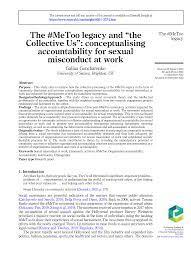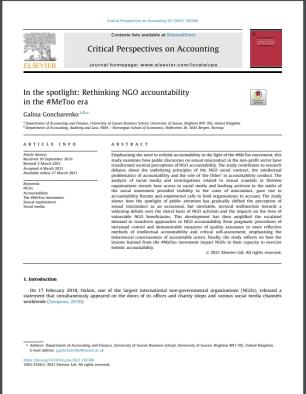
The #MeToo legacy and “the Collective Us”: conceptualising accountability for sexual misconduct at work

Purpose
This study aims to analyse how the collective processing of the #MeToo legacy in the form of community discourses and activism conceptualises organisational accountability for sexual misconduct at work and enhances the development of new accountability instruments.
Design/methodology/approach
The study draws on social movement theory and the intellectual problematics of accountability, together with the empirical insights from two research engagement projects established and facilitated by the author.
Findings
The study reveals multiple dimensions of how post-#MeToo community activism impacted the conceptualisation of organisational accountability for sexual misconduct at work. The movement enhanced discourses prompting a new societal sense of accountability for sexual wrongdoings. This in turn facilitated public demands for accountability that pressured organisations to respond. The accountability crisis created an opportunity for community activists to influence understanding of organisational accountability for sexual misconduct at work and to propose new accountability instruments advancing harassment reporting technology, as well as an enhancing the behavioural consciousness and self-assessment of individuals.
Originality/value
The study addresses a topic of social importance in analysing how community activism arising from a social movement has transformed accountability demands and thus both advanced the conceptualisation of organisational accountability for sexual misconduct at work and established socially desirable practices for it. The study contributes to theory by revealing the emancipatory potential of community activism to influence organisational accountability practices and to propose new instruments at a moment of organisational hesitation and crisis of accountability.
